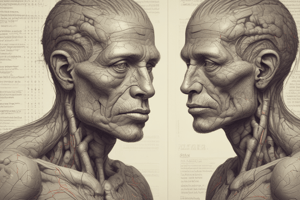Podcast
Questions and Answers
Who proposed that chromosomes carry the genetic instructions for an organism independently of each other?
Who proposed that chromosomes carry the genetic instructions for an organism independently of each other?
- Walter Sutton and Theodor Boveri (correct)
- James Watson and Theodor Boveri
- Thomas Hunt Morgan and Francis Crick
- Walter Sutton and Thomas Hunt Morgan
Which pioneer of genetic studies in Drosophila formulated the chromosome theory of inheritance?
Which pioneer of genetic studies in Drosophila formulated the chromosome theory of inheritance?
- Francis Crick
- James Watson
- Theodor Boveri
- Thomas Hunt Morgan (correct)
What groundbreaking discovery did the double helix model of DNA lead to?
What groundbreaking discovery did the double helix model of DNA lead to?
- Germ Theory of Disease
- Theory of Evolution
- Central Dogma of Molecular Biology (correct)
- Kin Selection Theory
Which advancement allowed the manipulation of genes and production of genetic recombination in the 1970s and 1980s?
Which advancement allowed the manipulation of genes and production of genetic recombination in the 1970s and 1980s?
What technology has enabled scientists to study gene editing through CRISPR-Cas9 and explore epigenetics in recent times?
What technology has enabled scientists to study gene editing through CRISPR-Cas9 and explore epigenetics in recent times?
Who were the ancient civilizations mentioned in the text that practiced selective breeding to improve traits?
Who were the ancient civilizations mentioned in the text that practiced selective breeding to improve traits?
Which Greek philosophers pondered the concept of heredity according to the text?
Which Greek philosophers pondered the concept of heredity according to the text?
What significant event reinvigorated interest in the study of inheritance, leading to Mendel's work on pea plants?
What significant event reinvigorated interest in the study of inheritance, leading to Mendel's work on pea plants?
Who were the three biologists credited with independently rediscovering Mendel's laws of inheritance in 1900?
Who were the three biologists credited with independently rediscovering Mendel's laws of inheritance in 1900?
What did Gregor Mendel's work on pea plants lay the groundwork for understanding in genetics?
What did Gregor Mendel's work on pea plants lay the groundwork for understanding in genetics?
Flashcards are hidden until you start studying
Study Notes
Unraveling the Threads of Genetics: A Journey through Time
Genetics, the scientific study of heredity and variation, has its roots buried deep within the sands of history. To understand the modern landscape of genetics, it's essential to delve into the evolution of our knowledge and the pioneers who paved the way.
Antiquity and the First Whispers
Genetics' origins can be traced back to early civilizations that practiced selective breeding to improve the traits of their crops and animals. In around 6000 BCE, ancient Egyptians were cultivating barley and wheat, and breeding dogs for various purposes. The Greek philosophers Democritus and Empedocles also pondered the concept of heredity, but it wasn't until the 19th century that genetics as a formal scientific discipline began to take shape.
Darwin's Garden and the Rediscovery of Mendel
Charles Darwin's On the Origin of Species (1859) reinvigorated interest in the study of inheritance, leading Gregor Mendel to publish his landmark paper on the principles of inheritance in 1865. Mendel's work on pea plants laid the groundwork for our understanding of genes, alleles, genotypes, and phenotypes. However, his discoveries were largely forgotten until 1900, when three biologists—Hugo de Vries, Carl Correns, and Erich von Tschermak—independently rediscovered Mendel's laws of inheritance.
The Chromosomal Era
In the early 20th century, Walter Sutton and Theodor Boveri independently proposed that chromosomes carry the genetic instructions for an organism. Thomas Hunt Morgan, a pioneer of genetic studies in Drosophila, discovered that genes were located on specific positions on chromosomes, and he formulated the chromosome theory of inheritance.
The Double Helix and Molecular Genetics
Francis Crick and James Watson discovered the double helix structure of DNA in 1953, revolutionizing genetics and providing a physical foundation for the understanding of genetic information and its transmission. The double helix model of DNA led to groundbreaking discoveries, such as the central dogma of molecular biology, which describes the flow of genetic information from DNA to RNA to proteins.
The Gene Revolution and the Human Genome Project
The 1970s and 1980s saw the rise of biotechnological advancements, such as recombinant DNA technology, which allowed the manipulation of genes and the production of genetic recombination. These techniques led to the Human Genome Project, which aimed to sequence the entire human genome and identify all human genes. The project was completed in 2003, providing a wealth of information about the human genome and laying the groundwork for future studies in genetics.
The Future of Genetics
As genetics continues to evolve, new technologies and techniques are enabling scientists to delve deeper into the mysteries of life at the genetic level. From gene editing through CRISPR-Cas9 to the study of epigenetics and the human microbiome, the future of genetics is both exciting and uncertain. As we explore the complexities of our own genetic code and the genetic codes of other organisms, we're poised to make extraordinary discoveries that will shape our understanding of life and our place in the universe.
Studying That Suits You
Use AI to generate personalized quizzes and flashcards to suit your learning preferences.




